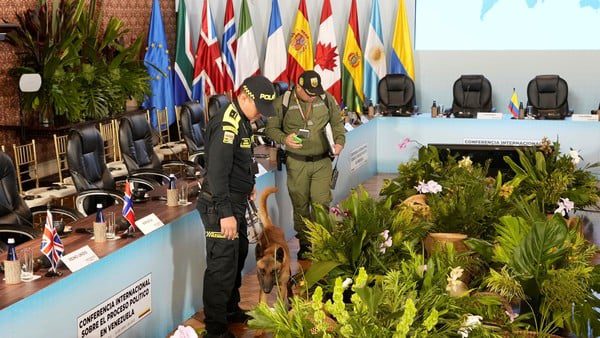Global Courant 2023-04-26 02:30:16
With a backpack over his shoulder and a scraggly beard, showing that he had not shaved for several days, Venezuelan opposition leader Juan Guaidó entered the Miami airport alone after taking a flight from Bogotá, where he was threatened with deportation or expulsion by of the government of Gustavo Petro.
Guaidó, who a few years ago had been recognized as the “interim president” of his country, had traveled to Colombia this Monday without prior notice to “listen to the parties,” as he declared, of the debates at the International Summit on the crisis in Venezuela. , convened by President Petro, who installed the event on Tuesday before 20 foreign delegations to try to resume dialogue in Mexico between the opposition and the Venezuelan government.
In the presence of the Venezuelan politician in Bogotá, the Colombian Foreign Minister, Álvaro Leyva, said in a hostile tone: “It is not known where Guaidó is. It is not that he wants to participate, he is not invited (Bogotá Summit)… If he does not appear, he runs risks, because he entered inappropriately and in Colombia we comply with the laws ”.
Venezuelan opponent Juan Guaidó, during an act in Caracas last October, Photo: AP
Previously, the head of Colombian diplomacy had declared in a video: “All Venezuelan opposition leaders who can come to Bogotá, go to the international conference.” It was an invitation to all because he met with the opposition delegation in the negotiating table in Mexico.
Upon his arrival in Miami, the 39-year-old Venezuelan leader was received by journalists from various media. He seemed relaxed, calm and in control despite the stressful trip to Colombia, a journey that took him more than 70 hours to reach the United States.
Guaidó took a bus from Caracas and crossed the land border through Táchira to Cúcuta. And from there he took another bus to Bogotá. While in the Colombian capital, he publicly learned of the threats from Foreign Minister Leyva. “In Colombia, the persecution against me is felt,” he said.
At the Bogotá airport, the immigration authorities were “very respectful, they treated me well,” he said, and they did not attack him or hinder his trip to the United States.
Since he was ousted from the interim presidency on January 5 by his own opposition allies, Guaidó has been under harassment from the Nicolás Maduro regime.
rumors and speculation
In recent weeks, the information that the Maduro regime was preparing his arrest intensified, to the point that “my family, my wife Fabiola and two young daughters, and my work team were directly threatened. There was everything, I am worried, my family is safe, but the risks against their physical integrity are still there latent, ”he told the Miami TV networks.
Guaidó will remain with his family (brothers and mother) in Miami and will probably go on an international tour to seek support from countries for the cause of freedom and elections in Venezuela.
Juan Guaidó says that the government of Nicolás Maduro sought to imprison him. Photo: AFP
There are different versions about the attitude of the Colombian government. According to Semana magazine, the Petro government would have facilitated Guaidó’s departure by giving him a plane to the United States. No source from the Bogotá foreign ministry confirmed in what capacity the opposition leader is being sent.
The Bloomberg agency notes that Petro, who does not plan to publicly welcome Guaidó, had been aware of his plans to flee to Colombia for about two weeks, the sources say. Whatever it was, the Venezuelan opponent promised that he would give the details of his escape.
International conference on Venezuela
Some 20 countries were invited to the international conference on the crisis in Venezuela, which will also be attended by the Spanish Josep Borrell from the European Union. The host Gustavo Petro wants the summit to produce an agreement to resume the negotiating table in Mexico between the parties, suspended for about six months.
Representatives of Argentina, Barbados, Bolivia, Brazil, Canada, Chile, France, Germany, Honduras, Italy, Mexico, Kingdom of Norway, Portugal, Saint Vincent and the Grenadines, South Africa, United Kingdom, United States will participate in the conference , Turkey and the High Representative of the European Union.
Colombian President Gustavo Petro met with his Venezuelan counterpart Nicolás Maduro last February, at the Atanasio Girardot Bridge, on the border between the two countries. Photo: EFE
In his meeting with members of the opposition on Saturday night, Petro said he hoped their summit could help set the dates for next year’s presidential election. He also asked about the political prisoners.
However, on the eve of the summit, the Maduro regime has once again questioned its willingness to dialogue with the opposition by imposing new conditions to sit down to negotiate again with the opposition.
In the first place, it demands the release of Alex Saab on trial in Miami on charges of corruption and money laundering and the elimination of the 720 sanctions against the Chavista regime.
“If the US does not deposit the 3,200 million dollars, we will not return to dialogue in Mexico,” Maduro demands, and also conditions the negotiation “on the suspension of the investigation in the International Criminal Court for crimes against humanity.”
For its part, the Unitary Platform, the coalition of 10 political parties and movements, demands the release of almost 300 political prisoners, the qualification of the political leaders who are in exile, the purge of the national electoral system, and the date of the elections. so that they are truly free and fair.
Many Venezuelans have doubts that Petro will achieve success. The former mayor of Hatillo, David Smolansky, a refugee in the US, wrote in Americas Quarterly: “The next summit in Bogotá represents almost the thirtieth attempt at dialogue and negotiation with the authoritarian regime of Venezuela.”
The official adds that “Maduro has used previous diplomatic efforts to buy time, demoralize Venezuelans, fracture the international community and crush the opposition.”
And he concludes: “This round may not be any different, unless Petro demands from Maduro the same policies on human rights and the environment that he has demanded in other contexts, such as within his own country.”
Caracas, special
CB








